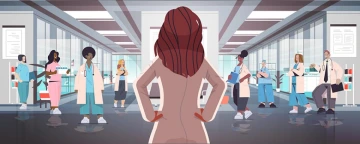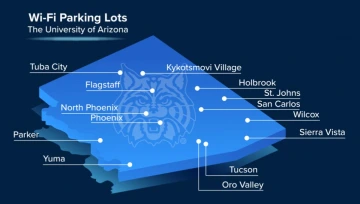Technology Transforming Teaching and Learning
3D Immersive Environment Enhances Leadership Education in Healthcare
The College of Nursing is taking a new approach to online learning by using virtual reality and video game like applications to teach students about real life healthcare scenarios. In FY20, the College’s IT department helped to launch two new “gamified” simulations in support of their teaching and service mission, specifically for the Master of Science in Clinical Systems Leadership (MSN) online program. The simulations are a huge step forward in the effort to develop a simulated healthcare system, Desert Regional Healthcare Alliance (DRHA), for leadership education.
As part of the Healing Environments and Practices course taught by Dr. Cheryl Lacasse, Clinical Professor of Nursing and Director of Teaching and Learning Practice and Evaluation, nursing students engage in a 3D virtual setting, similar to a video game, allowing them to “walk in” to a hospital room and change various aspects of the care environment. A Veterans Affairs Clinic scenario allowed students to enter a virtual clinic as an administrator and make choices to handle a crisis situation involving a disgruntled patient. The user must traverse the clinic, interact with other clinic administrators, and decide on a plan of action to deal with the crisis.
Applications Architect David Celaya-Gonzalez, and student worker and undergraduate computer science major Cullen Bates, used the Unity platform to complete initial development of the simulations in spring 2020. According to Celaya-Gonzalez, “Building these simulated environments definitely requires a blend of technology and art. Strong programming skills are required as well as a digital artist with an interest in online gaming to create 3D models and animate them.”
Bates created web versions of the 3D applications instead of native apps so that they could be experienced easily in a web browser. After further refinement, the applications were made available for download on the Windows and Mac platforms for summer 2020.
Dr. Cheryl Lacasse initiated grant funding for this work from the Center for University Education Scholarship (CUES), a private endowment managed by the Office of Provost, that supports teaching innovation. In the future, she would like to make the virtual healthcare system more accessible for broader use across College of Nursing and interdisciplinary health-related programs by encouraging continued development of leadership simulations.

Learn more about this story go to nursing.arizona.edu/cues-apps
Collaboration with College of Agriculture and Life Sciences Keep Students Connected

13
New Remote Wi-Fi Hotspots Outside Pima County
12
New Remote Wi-Fi Hotspot Parking Lots Around Campus
When students learned they would be finishing the semester remotely, it became clear that some didn’t have the internet connection they needed. As part of the University’s land-grant mission, several programs connect with communities from counties and tribal lands across the state. But in many rural areas, broadband internet and cellular service can be hard to find. Even in urban areas, economically disadvantaged families or areas can lack access.
UITS leaders partnered with the College of Agriculture and Life Sciences and quickly organized teams, including members of telecommunications services, estimating and engineering, network technicians and warehouse, and network operations, to implement internet hotspots.
In all, 13 sites outside of Pima County are now listed with the 12 campus parking lot sites on the newly created remote UAWiFi hotspots webpage, nine of which were are sites updated in spring 2020.
The Cooperative Extension offices in each Arizona county were identified for creating wi-fi hotspots for students to use. By parking in nearby lots, students could access the wi-fi from their cars, ensuring social distancing.
The UITS Technology leadership has worked on issues of internet connectivity with partners around the state for years. In addition to being one of three state universities, UITS is home to the Sun Corridor Network, Arizona’s 100Gbps education and research network.
